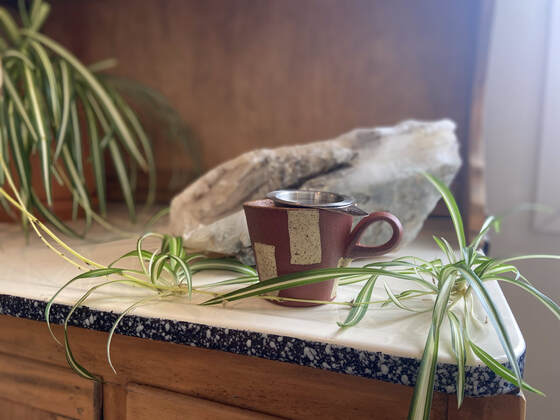|
Collectively, we have long understood the relationship between stress and the gut. Reflections on this connection shows up in common phrases, like "I get butterflies in my stomach when I'm nervous," and "I just felt me stomach drop with dread." Emotional strain can trigger digestive upset and has been shown to play a role in conditions like irritable bowel syndrome (IBS), the onset of inflammatory bowel diseases (IBD) and intestinal permeability (aka "leaky gut syndrome"). This relationship goes both ways: imbalances in the gut can trigger mood and cognitive imbalances too, including depression and Alzheimer's disease.
The connection between the gut and the brain/heart is complex, so I'll be adding to a collection of blogs on the topic over the coming months. Click on "The Mind-Gut-Heart Connection" category to learn more. We'll start the conversation at the end of the digestive tract - in the colon - with the ever-amazing microbiota. There are bacteria and yeast living in and on your body. That's a good thing. I sometimes joke that we need to look no further than these microorganisms sharing our bodies for the meaning of life: our purpose is simply to play host. Make them comfortable and well-fed. If we do that, we've got a good start on a good life. When our microbiome is healthy and robust, those bugs make nutrients for us, like short chain fatty acids and vitamins. They transform compounds in our food, like fiber and phytonutrients, into useful forms. They maintain our colonic environment and help us maintain digestive health. They communicate with and enhance our immune systems, and help us prevent disease. They even make neurotransmitters like serotonin and dopamine to facilitate positive thoughts and balanced emotions. So playing the role of a gracious host really does go a long way on our wellness journey! The most accurate term for these bacteria and yeast living in and on our body is "microbiota," a term used interchangeably with "microbiome," though they are distinct words. "Microbiota" refers to the microorganisms found in an environment, while "microbiome" actually describes the collection of genetic material from said microorganisms. I might use these words interchangeably because "microbiome" is more commonly used and I think it's more important to see the big picture than get caught in the weeds. On the human body, there are microbiota found in the sinuses, respiratory tract and lungs, the mouth, the skin, and the digestive tract. The most heavily populated microbiota is found in the colon. In and on the human body, there are 10 times more microbiota cells then there are cells of human origin. In other words, there are ~150 times as many genes coming from microorganisms than from the human genome. (Learn more about the microbiota in Dr. Barrett's blog article here.) Stressful encounters change the microbiota...and the microbiota changes the stress experience. Stressful experiences early in life inform the composition of the microbiota by impacting the type and abundance of microorganisms that colonize the colon. It is estimated that the microbiota is established by age three, so these early childhood experiences can have a lifelong impact on an individual's microbiota. At all stages of life, beneficial microorganisms like Lactobacillus sp. decline in the presence of stress - even short-term stress. Lactobacillus is a genus of bacteria that is well-studied and easily found in over-the-counter probiotic supplements and fermented foods like yogurt. It's an important "bug" for many reasons, one of which is that it reduces inflammation in not just the digestive tract, but throughout the body. Repeated exposure to stressors has an exponential impact on Lactobacillus species and other beneficial microorganisms in the microbiota, giving us another reason to reduce stress and build resilience. Interestingly, the composition of the microbiota also impacts how a person responds to stress. Potentially pathogenic microorganisms, like E. coli, can trigger a heightened stress response. Similarly, a microbiota that is not diverse or abundant in beneficial microorganisms can also heighten the stress response. In other words, stress impairs the health of the microbiota. And a sick microbiota exacerbates the harmful impact of stress. Addressing gut health - including the health of the microbiota - is a necessary component of any functional nutrition plan. This becomes all the more important when lifestyle factors like stress and resilience (the ability to recover from stressful experiences) are indicated in the root cause of symptoms. Incorporating ferments, fibers, therapeutic probiotic therapy and nutrients that enhance the ecosystem of the colon may all be recommended to balance HPA axis imbalance, support recovery from burnout and enhance resilience. References:
0 Comments
Mental health is not relegated to the brain. In fact, the digestive tract - especially the colon - play a key role in the production and reception of neurotransmitters, which is one of the reasons the gut has been called our 2nd brain. More specifically, the "2nd brain" is the ecosystem of microorganisms (the microbiota) taking up residency in the colon. To learn more about the microbiota read my long-time collaborator, Dr. Barrett's blog titled Microbiome and my previously published blog, This is Your Microbiota on Stress.
One way that the microbiome communicates with the brain is by stimulating the vagus nerve. The vagus nerve travels down the brain stem into the spinal column, innervates the abdomen and then spreads out to create a web-like cage for the digestive tract. Microbes in the colon ”tickle” the vagus nerve to communicate directly with the brain, stimulating production and secretion of neurotransmitters that contribute directly to mental wellness, including serotonin, dopamine and others. Additionally, the microbiota play a significant role in what kind of signaling molecules are produced in the gut that then communicate with the brain. The microbiota also impacts a part of the brain called the amygdala. The amygdala "...is commonly thought to form the core of a neural system for processing fearful and threatening stimuli, including detection of threat and activation of appropriate fear-related behaviors in response to threatening or dangerous stimuli." The composition of the microbiota - both the overall population and the diversity of the ecosystem - impacts how the amygdala develops a response to stressful stimuli and the extent to which anxiety manifests in an individual. In this way, microbiota modification via diet, lifestyle and therapeutic probiotic supplements holds promise for mental health. Another way in which the health of the microbiota contributes to the health of the mind/heart is via maintenance of the structural integrity of the digestive tract. In addition to beneficial microbes like species of lactobacillus and bifidobacteria, we also host strains of streptococcus and staphylococcus, candida and other yeasts. These potentially pathogenic microbes make toxic compounds called lipopolysaccharides (aka endotoxins). Lipopolysaccharides (LPS) dismantle the harmony not just in the colon but in the small intestine too. When the microbiota is imbalanced and the potentially pathogenic microbes gain a stronghold, over time the accumulation of LPS in the digestive tract can cause intestinal permeability or "leaky gut syndrome." In a leaky gut, the barrier of the small intestine is inflamed and compromised to the extent that nutrients are not absorbed and larger molecules escape the digestive tract intact, causing inflammation throughout the body. With leaky gut we are posed with two factors contributing to mental wellness:
Here are a couple action steps you can take now for your gut - and mental - health:
These recommendations are not going to be appropriate for everyone, so it's always a good idea to consult a health care provider to get an individualized wellness plan. References
The liver deserves much respect and care. It has literally thousands of jobs that it does every single day for us…and honestly, as a culture we don’t treat it with the reverence it deserves! Alcohol, sugar, fried foods, stress, a sedentary lifestyle, environmental pollution, toxic body care products, insufficient (or poor) sleep…all compromise liver functioning in one way or another. Including liver health in daily self-care intentions is a must for us all.
Here are some highlights of what the liver does for the body:
With this lengthy list in mind, it’s no wonder that liver health is a hot topic in the wellness world. Liver supportive foods and nutrients, cleanses and detoxification programs are abundant on the internet, including our own website and blog. Supporting liver health is critical to maintaining whole-body health. While targeted programs may be warranted and recommended by health care providers, there are some daily self-care practices that can help optimize the liver’s efforts. There are a number of things I think about when planning my self-care efforts that puts my liver’s health in focus, but one of my favorites is to drink tea. Green tea, rooibos and chamomile tisanes all increase the production of glutathione in the liver. Glutathione is considered to be the master antioxidant in the body, meaning that it helps combat oxidative stress in every organ system. Increasing glutathione not only loves up our livers, but helps to bring balance in our mental health, digestive health, immunity, cardiovascular system, kidneys and more. It takes several cups of tea daily to make a big impact on glutathione production, but other factors like diet and lifestyle also contribute...it all adds up! Making a pot of tea to sip on these cold days is certainly a welcome habit. Here are some of my favorite combos and brands (no affiliation or sponsorship):
What are your favorite ways to enjoy these teas? Share your recipes and tips in the comments! To learn more about the holistic perspective on liver health and other daily self-care practices, check out these articles: Then, try out these liver-loving recipes:
References:
Whether breakfast is the most important meal of the day or not, it sure seems to be the most challenging for people to look forward to. For most of my clients, breakfast needs to be quick, easy and convenient. These needs are often somewhat at odds with a lot of health goals.
My nutrition guidance around breakfast usually includes the following:
True confession: this is hard for me. I love a long, slow morning. I wake up at least 2 hours before I need to leave the house so I can bring a cup of coffee back to bed to journal and meditate (and often text excessively with my ride-or-die). It's one of my daily pleasures. And while you would think 2 hours is plenty of time to do that, eat some breakfast, get my pup out for a walk and get ready for my day, I savor the pleasure so much that I haven't been making much time for all those other things lately! TL;DR: Breakfast needs to be quick, easy and convenient for me too. Here are some tips for making breakfast work better for you. I'll follow those tips with some breakfast ideas and recipes. Include Breakfasts in Your Meal Plan One of the most obvious ways to make a good (delicious, sustaining, nutritious) breakfast happen is to plan for it like you plan for dinners and lunches. A lot of people forget to include breakfast in their meal plans - the most convenient meal is one that's already planned out! Organize Breakfast Options Sometimes the hardest part about deciding what to eat for breakfast is coming up with one idea that sounds even kinda, sorta tasty. Make it easier on yourself: keep a list. Every time you have a delicious breakfast, write it down. Writing it down could mean saving the recipe to a folder on your desktop or bookmarking it in a browser folder...whatever works for you! But save it for the day you lose all inspiration and just need a spark of "yum!" Meal Prep to Include Breakfast If you have a routine for a weekly meal prep, include breakfast. Many of the recipe and meal ideas below can be prepped ahead and reheated. What's quicker than that?! Breakfast Ideas and Recipes Here are some of my current breakfast staples and some others that have stood the test of time:
How do you make breakfast stress-free? Share your tips in the comments below! |
I love food.I love thinking about it, talking about it, writing about it. I love growing food, cooking and eating food. I use this space to try to convey that. Follow me on social media for more day-to-day inspiration on these topics. Categories
All
|




 RSS Feed
RSS Feed